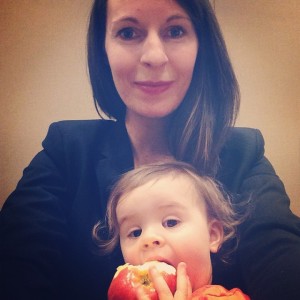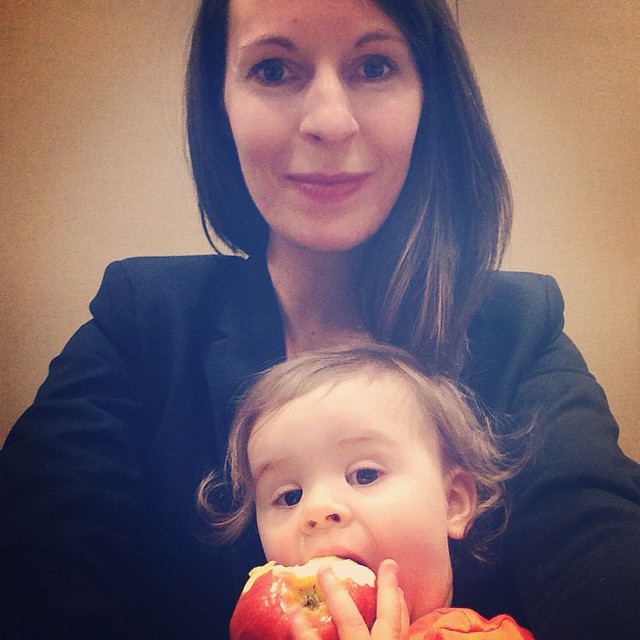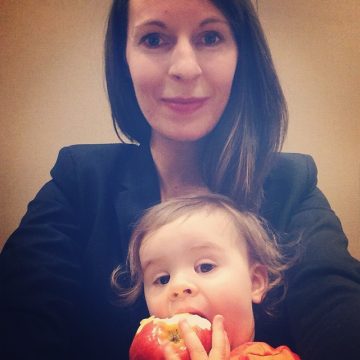I said this to my Relief Society sisters Sunday, more or less. (Not included are the beautiful, thoughtful answers they said back.) (If you happen to still be teaching Lesson 15, please check out Spunky’s inclusive and thorough plan.)
Divinity of Parenthood
What I hope that you will get from this lesson is that both fatherhood and motherhood are godly, and that cooperative parenting is the most godly of all.
Benson said, “A mother’s role is ordained by God. [Mothers] are, or should be, the very heart and soul of the family. No more sacred word exists in secular or holy writ than that of mother.”
Our Differences
Before I go further, I want to acknowledge that this topic can be sensitive. While we are all daughters of God and sisters in the gospel, we have different lived experiences. Some of us have never married, and never had children. Some of us have married, but now carry the load of parenthood by ourselves. Some of us are stepmothers. Some of us are adoptive or foster mothers. Some of us who do not have children, desperately wish to. Some of us who have children, at times desperately wish not to. Some of us are expectant mothers. Some of us are new, new mothers. Some of us are just pretty new. Some of us are seasoned. Some of us are empty nesters. Some of us are grandmothers. Some of us have difficult relationships with our own mothers. Some of us have no desire to be mothers. Some of us are mothers to everyone we meet.
I honor these differences. My hope is that we can draw upon them, and speak honestly and openly from our own experiences, to better learn from each other, and increase in charity and understanding.
Heavenly Father and Heavenly Mother: Celestial Models For Earthly Parenthood
Fairly early on in the lesson manual, President Benson states that “our pattern, or model, for fatherhood is our Heavenly Father,” and asks “How does he work with his children?” Benson didn’t add that our pattern, or model for motherhood is our Heavenly Mother, but he could have.
When Sister Holland, was serving in the General Young Women’s Presidency, she said,
I have heard it said by some that the reason women in the Church struggle to know themselves is because they don’t have a divine female role model. But we do. We believe we have a mother in heaven… Furthermore, I believe we know much more about our eternal nature than we think we do; and it is our sacred obligation to express our knowledge, to teach it to our young sisters and daughters…And all of us are Eve’s daughters, whether we are married or single, maternal or barren. We are created in the image of the Gods to become gods and goddesses. And we can provide something of that divine pattern, that maternal prototype, for each other and for those who come after us.
Shared Responsibilities
The current lesson contains two lists from President Benson. The first is of things that are good for fathers to know and do. The second is of things that are good for mothers. There are a small number of differences, for instance, fathers alone may baptize and confirm their children, or ordain male children to the priesthood, but there is much more that is shared in common. This makes sense, because as Benson taught, “Parents should work together in unity and love in raising their children.” (Spunky made a detailed chart of the differences and similarities here.)
Many of the shared items are things that we would expect to show up, like praying with our children, and helping our families have Family Home Evening. Others are a little bit sweeter, like reading out loud to our children, helping them love great literature, and continuing to tell them we love them, even if they are older, and it is a little bit embarrassing to them, and a little bit harder for us. Then there is spending time, together as a family and individually, with one parent and one child, listening to whatever the child wants to talk about. (This is something that one of President Benson’s son, Mark, reported that he did very well, and helped him feel loved by his father.) Closely related are family work experiences and family adventures or trips, which help to forge deep relationships and build a reservoir of memories. There is sharing meals together, as often as possible.
I read so many of these as ways to help each family member feel loved. What would you add?
How do you try to do these good things, without feeling guilty when it’s not quite possible to do them all?
Why do you think it’s important that so many responsibilities of parenting are shared between parents?
On Home
Both President Benson and his wife, Flora, spoke on the importance of the home. He taught, “You must help create a home where the Spirit of the Lord can abide. … Your homes should be havens of peace and joy for your family…. A [parent’s] duty is to make [their] home a place of happiness and joy. …” and Flora stated, “The home is the center of our mortal affections.”
This matches something that Stephanie Nielson, an LDS plane crash survivor and blogger shared recently for TODAY: “Home is where we are safe, happy and accepted. I want everyone who comes here to feel that way, especially our children.”
We can all try to create these kinds of spaces, whether material spaces, such as our homes, or non-material spaces, such as our conversations and relationships.
What are real things you do to try to create safe, happy, and spiritual spaces?
What Motherhood Looks Like For Me
Next I want to say a tiny bit about what mothering has looked like for me, before asking what motherhood has looked like for you, in all of your diverse, lived experiences. I want to do this, because motherhood doesn’t always look (or feel) very holy, and because I think it is important to share both sorrows and joys.
On one hand, it looks like being really, really tired, and often lonely. When Cora was born, one of the things that surprised me was how lonely I felt, when I was never, ever alone. It looks like signing and saying, “Mama,” “milk,” “baby,” “more,” “please,” and “thank you.” It looks like explaining things simply and often. It looks like feeding and comforting Cora, even when I don’t want to (especially when I don’t want to, at strange hours in the night). It looks like pauses, while trying to take a shower, do the dishes, read a book, or write a paper. It looks like no longer sleeping or working on planes. It looks like turning around at a banquet to see that she took off both her dress and her diaper. It looks like raisins and chocolate chips spilled on the floor. It looks like (very) occasionally missing out on things that I would like to participate in.
On the other hand, it frequently looks happy. It looks smile and laughter filled, because it is. It looks like a miracle, to watch a tiny baby grow into her body, and to watch her learn, how to smile, sit up, crawl, walk, run, dance, and speak. Every day she learns new words. (Two of her most recent are “Wittgenstein” and “dinosaurs.”) It looks like introducing her to delicious foods and experiences, and hearing her ask, “Chocolate? Chocolate?” It looks like walks to the ocean, and the most beautiful children’s books. It looks like exceptionally good eye contact, and the tenderest hugs.
My best mothering experiences come when I am being most myself, rather than simply being swallowed up in my daughter. This doesn’t look like ignoring her or her needs, but simply including her in whatever I need to do. And for me, in my dual roles of mother and student, this looks like reading to her from my philosophy and theology books, and my philosophy and theology papers. (She and my father are my first readers/listeners, always.) It looks like taking her to two summer seminars and seven academic conferences. It looks like letting her press send on the email submitting Mormon Feminism to the publisher, because while she was too little to understand, we both made sacrifices to be able to send it.

I know that what motherhood will look like for me will be different in 5, 10, 15, 20, years.
What does it look like for you?
Lets help support each other in whatever stage we are in, with whatever desires and realities we have.
Conclusion
Parenthood works best when we support each other as sisters, and when mothers and fathers work together as “equal partners.”
Elder Robert D. Hales said, “The doctrine of the family begins with heavenly parents. Our highest aspiration is to be like them.” And, a much earlier General Authority, John A. Widtsoe, stated,
There is radiant warmth [in the] thought that among the exalted beings in the world to come we shall find a mother who possesses the attributes of Godhood. Such conceptions raise motherhood to a high position. They explain the generous provision made for women in the Church of Christ. To be a mother is to engage in the eternal work of God.
What does motherhood, or parenthood, look like for you? The highs, the lows, or perhaps the non-existences?







8 Responses
I love this: “Parenthood works best when we support each other as sisters, and when mothers and fathers work together as “equal partners.” And I love that you shared what motherhood really looks like to you. Too often in the church I hear about how important motherhood is, especially from men who look at it from the outside, reaping the benefits of it from their wives and mothers, but not actually experiencing what it is like to be a mother. I agree with you that motherhood can be a very lonely thing and I love it when I can share it with other women.
Motherhood has looked different to me at different stages. Right now it looks chaotic and overwhelming. It looks like children who are hard to motivate, who fight over every little thing, who are spoiled and priviledged and obsessed with electronics. I feel like I spend all the time I used to spend doing art projects, reading with them, and playing in nature, breaking up fights, trying to get them to practice their piano and do their homework, and running them from place to place. Between my oldest who is starting to explore the world outside my home, and my youngest who terrorizes me with her tantrums and bossy attitude, I am completely maxed out. I am asked so many questions in the course of a day that my good judgement is completely spent by 5 o’clock when I start saying, “Ask Dad.” And cleaning my house is like trying to rake leaves on a windy day. But, as my kids are getting older, I get to introduce them to things that I love to do. I get to spend time with them doing more of the things that I enjoy. Through all of the work and the struggle that I mentioned above, I see glimpses of children who are learning and growing and becoming really great people. They fight, but they are learning how to deal with conflict. And every once in a while, they will handle it the way I am trying to teach them to handle it. They are spoiled and priviledged, but they are learning to recognize that and becoming more generous. Life at home is crazy and chaotic, but we are growing together. And now that I am overcoming my Mormon Mommy Martyr Syndrome, I am more willing to let my kids be independent, to let other people help, to let my husband be an equal partner, and to let myself do things I love. That makes all the difference, because when things are as hard and crazy as I mentioned, I still have things outside of motherhood that I love, that renew me and give me the energy to work through the struggle with my kids.
Thank you so much for sharing what motherhood looks like for you. So challenging and inspiring and changing. I especially love your ending: “I am more willing to let my kids be independent, to let other people help, to let my husband be an equal partner, and to let myself do things I love. That makes all the difference, because when things are as hard and crazy as I mentioned, I still have things outside of motherhood that I love, that renew me and give me the energy to work through the struggle with my kids.”
This made me want to be in CT and hear this lesson. Well done! I love your insights.
That would have been so nice/I would have loved to hear Your insights! xo
I enjoyed your comment that your best mothering experiences are when you’re being yourself. I think that is a great point and good advice. Beautiful post!
Thank you, and thank you!
Thank you for acknowledging the complexities surrounding the role of mother and the importance of supporting one another regardless of the differences in individual roles life assigns at different times.
You are welcome. It felt deeply important to me to try.